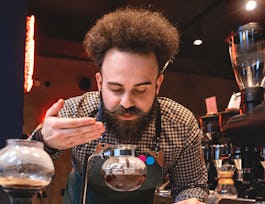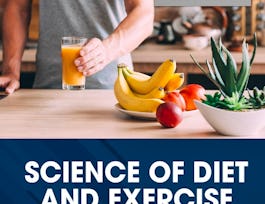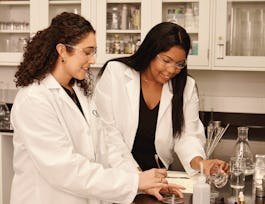This course introduces several basic scientific principles underpinning the methodology of cooking, food preparation, and the enjoyment of food. All topics covered have a strong basis in biology, chemistry, and physics application. Among others, they include the consumption of cooked food, the physiological and evolutionary implications of the senses, geographic and cultural influences on food, and the rationale behind food preparation. We will also discuss issues such as coupling of senses to improve sense stimulation; altering flavor by chemical means, and modification of the coloration to improve the appearance of dishes. Following the video demonstrations of the scientific principles of cooking, you will learn to recognize the key ingredients and their combinations for preparing good healthy food. You will also be asked to try out and practice specific cooking principles through the weekly assignments; analyze your data and make comparisons of your experiences with others.

New year. Big goals. Bigger savings. Unlock a year of unlimited access to learning with Coursera Plus for $199. Save now.


(769 reviews)
Skills you'll gain
Details to know

Add to your LinkedIn profile
9 assignments
See how employees at top companies are mastering in-demand skills


Earn a career certificate
Add this credential to your LinkedIn profile, resume, or CV
Share it on social media and in your performance review

There are 7 modules in this course
Before you start with the content for Energy Transfer, please watch the Course Overview, review the Grading Scheme, and read the Important Note on special dietary needs.
What's included
12 videos2 readings
This week, we will talk about Hunger and Satiety. There will be two interesting assignments for you to work on.
What's included
14 videos3 readings2 assignments1 discussion prompt
This week, we will talk about how food flavor affects our perception of taste. Again, there will be two interesting assignments for you to work on.
What's included
13 videos2 readings2 assignments1 discussion prompt
This week, we will talk about how the aroma of food affects our perception of taste. We have prepared one assignment on this topic for you to work on.
What's included
12 videos1 reading1 assignment1 discussion prompt
This week, we will talk about how the color of food affects our perception of taste.
What's included
9 videos1 reading1 discussion prompt
This week, we will talk about how the texture of food affects our perception of taste. There will be two interesting assignments for you to work on.
What's included
12 videos2 readings2 assignments1 discussion prompt
This week, we will see how fruits and vegetables can enhance the quality of cooking. There will be one assignment related to this topic for you to work on. After completing all the content, it's time to test your understanding of the entire course. Take the final exam and help review this course. Your valuable feedback will certainly help us improve future iterations of the course.
What's included
12 videos2 readings2 assignments1 discussion prompt
Instructor

Recommended if you're interested in Basic Science

University of California, Davis

University of California, Irvine

National Academy of Sports Medicine
Why people choose Coursera for their career




Learner reviews
769 reviews
- 5 stars
76.19%
- 4 stars
16.68%
- 3 stars
4.52%
- 2 stars
1.29%
- 1 star
1.29%
Showing 3 of 769
Reviewed on Jan 9, 2023
This course provides different insights to cooking. Professor compares and relates various experiment which makes this course easy to learn and remember
Reviewed on Aug 25, 2020
Everything went well. I don't really like book in a sense, like reading but not exam, that's why I tried so many times. Taught me patience, ...spend time wisely...cook different fish in different ways
Reviewed on Sep 24, 2023
The courses were very easy to follow and very informative. The teacher explained all the material in a very intuitive way and I really enjoyed the experiments.
New to Basic Science? Start here.

Open new doors with Coursera Plus
Unlimited access to 10,000+ world-class courses, hands-on projects, and job-ready certificate programs - all included in your subscription
Advance your career with an online degree
Earn a degree from world-class universities - 100% online
Join over 3,400 global companies that choose Coursera for Business
Upskill your employees to excel in the digital economy
Frequently asked questions
Access to lectures and assignments depends on your type of enrollment. If you take a course in audit mode, you will be able to see most course materials for free. To access graded assignments and to earn a Certificate, you will need to purchase the Certificate experience, during or after your audit. If you don't see the audit option:
The course may not offer an audit option. You can try a Free Trial instead, or apply for Financial Aid.
The course may offer 'Full Course, No Certificate' instead. This option lets you see all course materials, submit required assessments, and get a final grade. This also means that you will not be able to purchase a Certificate experience.
When you purchase a Certificate you get access to all course materials, including graded assignments. Upon completing the course, your electronic Certificate will be added to your Accomplishments page - from there, you can print your Certificate or add it to your LinkedIn profile. If you only want to read and view the course content, you can audit the course for free.
You will be eligible for a full refund until two weeks after your payment date, or (for courses that have just launched) until two weeks after the first session of the course begins, whichever is later. You cannot receive a refund once you’ve earned a Course Certificate, even if you complete the course within the two-week refund period. See our full refund policy.



